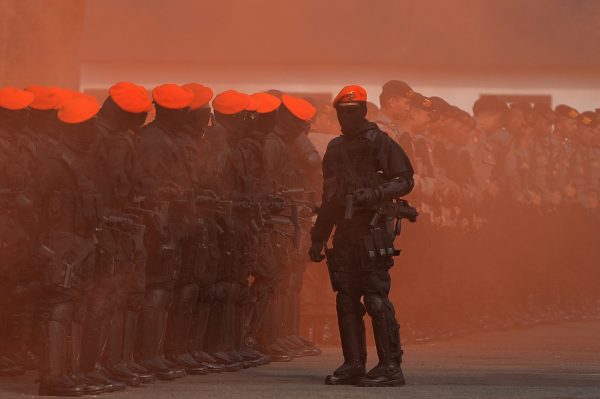Scholars of counterterrorism highlight the importance of economic conditions — which act as fuel for terrorism — and the value of economic and social policies as countermeasures. Economic deprivation, feelings of social injustice and political fissures directly affect levels of terrorist activity. An essential tenet in fighting terrorism lies in promoting economic growth and combating inequality. COVID-19 has stretched already limited government resources in many developing countries. Inability to prevent widening social and economic cleavages inadvertently creates opportunities for terrorist and extremist groups to step in, primarily through social service provision and charity.
According to the World Bank, COVID-19 may reverse decades of advancements in poverty reduction and development. Despite the efforts of governments, the secondary impacts of the pandemic — including losses of income, unemployment, societal panic and frustration — are severely disrupting societies. Corruption and misappropriation of relief-funds by local authorities in some countries are also fuelling social fragilities.
NGOs that play a critical complementary role in the provision of social services are also struggling. Many already operate with limited staff and volunteers and funding restrictions. As the crisis continues to unfold, a large segment of the community, especially in countries with a fragile social service infrastructure, must depend on livelihood support. This may not be available from the state or NGOs. Terrorist front organisations in the social service sector may then step into the picture.
Terror-linked charities that provide public goods and social services must be watched closely. Al-Qaeda affiliates have used charities to exploit crises to gain legitimacy and recruit militants. In Southeast Asia, Jemaah Islamiyah (JI) has a history of recruiting through the provision of social services. They provided long-term relief for victims of the 2004 Aceh tsunami and 2006 Yogyakarta earthquake. JI charities provided family support, healthcare and welfare for victims affected by these crises.
In South Asia, Lashkar-e-Taiba, a Pakistan-based group that orchestrated the 2008 Mumbai attacks, used its network of charities to provide relief during the 2005 Kashmir earthquake and 2008 Ziarat earthquake. Bangladeshi terror-linked charities have tried to reach out to Rohingya refugees who fled Myanmar.
Aid provided by terror-linked charities helps terror groups gain legitimacy, not only among their immediate beneficiaries but also among the broader population. Communities that receive assistance from terror-linked charities consider them as an alternative to elected or appointed officials. Support for terror-linked charities can easily be manipulated to encourage vulnerable beneficiaries to take part in violent agendas. The COVID-19 crisis is an opportunity for terrorist groups to further their cause, especially in places where they already have a presence. Despite changes in the affiliations of terrorist networks, the operations of terror-linked charities remain mostly unchallenged.
Franchises and affiliates of the so-called Islamic State (IS) use digital platforms to raise funds for humanitarian efforts locally. Southeast Asian charities such as the Aseer Cruee Center, Anfiqu Center and the One Banner Project are actively raising funds through terrorist-affiliated Telegram channels and Facebook groups to support the families of IS fighters from Indonesia and the Philippines. Using Bahasa Indonesia, Bahasa Melayu and several Filipino dialects, these groups fundraise from Indonesia, Malaysia, Singapore and the Philippines.
In 2019 three Indonesian domestic workers in Singapore were detained and subsequently jailed by authorities for allegedly donating money to these charities. The COVID-19 induced economic slump across vulnerable areas in Indonesia and the Philippines may further cement the support and presence of these organisations in various affected communities.
Inadequate state relief during the COVID-19 pandemic, especially in countries already struggling to contain terror threats, will be an opportunity for terrorist networks to raise and move funds. If these groups remain outside the purview of the state authorities responsible for countering terrorism financing, they will be able to finance their activities with relative ease. When resources are funnelled towards more immediate COVID-19 needs, more cracks will appear in social services and welfare systems to the benefit of terrorist financing and recruitment. Terrorist groups and their front organisations will exploit these weaknesses to gain legitimacy and boost recruitment.
Closely watching terror-linked charities and creating an effective response are crucial to containing the threat. Appropriate laws and effective enforcement will be critical if extremist charities are to be curbed. Strong partnerships between state, society and the private sector are needed to ensure adequate social welfare provision, and to address the financial and social needs of vulnerable groups. Programs to engage and educate communities about safe and responsible donations are also needed to ensure that genuine charities benefit rather than terror-linked charitable fronts.
Iftekharul Bashar is an Associate Research Fellow at the International Centre for Political Violence and Terrorism Research, S Rajaratnam School of International Studies (RSIS), Nanyang Technological University (NTU), Singapore.
Kenneth Yeo Yaoren is a Research Analyst at the International Centre for Political Violence and Terrorism Research, S Rajaratnam School of International Studies (RSIS), Nanyang Technological University (NTU), Singapore.


No different than Al Capone using his power to help out the poor and the Japanese Yakuza providing emergency aid to the people during floods and earthquakes while the government was still trying to get back on its feet.
If the various Asian governments were dominated by wealthy people and business people plus provided even the basic necessities of living plus allowing people economic upward mobility, then these extreme charities wouldn’t exist.